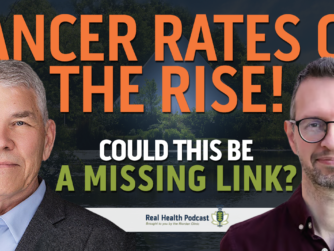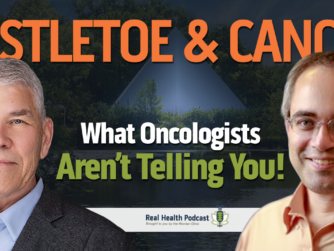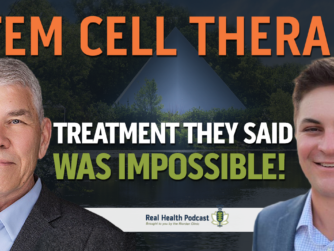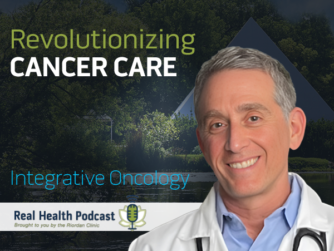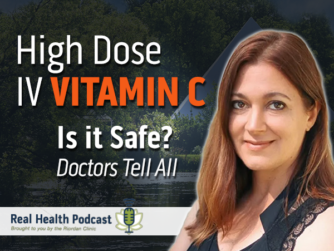In this episode of the Real Health Podcast, Chief Medical Officer Dr. Ron Hunninghake, MD, and Jess Higgins Kelley, MNT, ONC, founder of the Oncology Nutrition Institute, discuss the importance of hydration and its role in cancer and overall health.
Thanks to This Episode’s Sponsor
Riordan Clinic Nutrient Store: https://store.riordanclinic.org/
Links
Learn more about the host:
Dr. Ron Hunninghake, MD
https://riordanclinic.org/staff/ron-hunninghake-md/
Learn more about this episode’s guest:
Jess Higgins Kelley, MNT, ONC
https://www.oncologynutritioninstitute.com/
Read the Transcript
Disclaimer: The information contained on the Real Health Podcast and the resources mentioned are for educational purposes only. They’re not intended as and shall not be understood or construed as medical or health advice. The information contained on this podcast is not a substitute for medical or health advice from a professional who is aware of the facts and circumstances of your individual situation. Information provided by hosts and guests on the Real Health Podcast or the use of any products or services mentioned does not create a practitioner-patient relationship between you and any persons affiliated with this podcast.
Intro: This is the Real Health Podcast brought to you by Riordan Clinic. Our mission is to bring you the latest information and top experts in functional and integrative medicine to help you make informed decisions on your path to real health.
Dr. Ron Hunninghake: Okay, well welcome everyone. This is Dr. Ron Hunninghake and we’re here today for another episode of the Real Health Podcast and I’m very delighted that Jess Higgins Kelley is my guest today. And Jess, thank you so much for agreeing to be on our program.
Jess Higgins Kelley: Thanks for having me. It’s an honor to be here and great to meet you.
Dr. Ron Hunninghake: So Jess, the way we connect is that Jess was the co-author of a fantastic book, “The Metabolic Approach to Cancer.” So Dr. Nasha Winters, who our listeners are aware of, she’s the other co-author. And so I was going to just start out by having you tell us a little bit about your background as a cancer oncology nutritionist.
Jess Higgins Kelley: Yeah, so I started out actually with an undergraduate degree in journalism. So I worked for many years, I still do writing, editing for magazines and newspapers and always loved to write, and journalism’s really about getting the real story, which I’ve always loved, and help getting to know later on with clients not shying away from asking hard or uncomfortable questions. And after journalism school, I graduated in 2010 as a master nutrition therapist from the Nutrition Therapy Institute in Denver, Colorado. And then I was lucky enough to work at a clinic in Durango with Dr. Nasha and Dr. Kirsten West, one of your own. And we were doing some really cutting-edge stuff with the oncology population. Definitely results. And it was a blast, and it was a great team, and it was really there that a lot of the early learning happening and happened with metabolic dietary therapies.
And sometime around 2013, Nasha and I were like, “Hey, let’s write a book. Let’s write the metabolic approach to cancer.” And we weren’t too sure if it was going to be a bit ahead of its time. Certainly then, as you know, no one in the nutrition world was talking about cancer. It was absolutely taboo in the nutrition world to talk about cancer at all. But the journalist in me is like, “Oh yeah, let’s do it.” Nasha had great ideas. I had a writing background, and so we’re working in this clinic and we’re working on the story and on the book and right in the middle of writing it, we’re in a contract with a publisher. We had a deadline and my dad got diagnosed with GBM, which is the most aggressive form of brain cancer. And so I kind of went all in digging into as much research.
The book really came to life because it meant more being on the patient’s side really of the cancer process and leading to the incredible power of ketogenic dietary therapies and therapeutic fasting, especially with neurological cancers and that. So at the same time, writing the metabolic approach to cancer, I was also teaching at NTI, I was teaching clinical nutrition and several other courses, and I thought, “Hey, let’s build a program out of this.” At the same time, an education program for nutritionists because there wasn’t anything, and there still really isn’t anything available for nutrition medical practitioners right now. And so the Oncology Nutrition Institute was born. I officially founded it in 2017, and the book came out in 2017, and it’s continued to be a smashing success, which is great. Nasha and I are so pleased. And it’s been a great ride and been wonderful to reach so many people with what seemed to be new information about.
Dr. Ron Hunninghake: Well, I think what is so groundbreaking is that most people, when they think of cancer, they think of as this monolithic thing, cancer or the cancer tumors themselves. And what the metabolic book did is it helped people understand that tumors just don’t suddenly arise. That there are reasons, imbalances, factors in the body, metabolic factors that create a predisposition for getting cancer. And so logically then, if you can figure out what those predisposing factors are and address them individually, what in the book I think you call the terrains of cancer, you can actually dismember, shall we say, or take apart the reason why the person got the cancer. In other words, help them get better, help them get better. And so today we could spend, we don’t have enough time to go into all 10. And there’s one that I don’t even think it’s exactly mentioned in the book, but we were talking earlier about the importance of a person being hydrated, adequately hydrated. And it may be surprising to our audience that if you are chronically dehydrated, that can be a risk for cancer. Can you kind of go into that a little bit because that’s a fascinating thought because the reason I think it’s fascinating is because we can all do that behavior better if we just understand how important it is. But how does it link to cancer?
Jess Higgins Kelley: So chronic dehydration over time, which it becomes very easy to get dehydrated quickly. So it’s the only nutrient that we only can live without it for three days. So after three days, we die. There’s no other nutrient around that is required in that frequency, in that amount. And even a 2 percent loss of fluids has been found to increase the risk of several metabolic conditions, specifically because it can reduce the function or potentially lead to the damage of mitochondria. So mitochondria use hydrogen from water to help produce ATP. So when we’re dehydrated, there’s just going to be less hydrogen around. And then secondly, because there’s less water to help carry away some of the toxic byproducts of metabolism, there’s more of a chance of some of these potentially mitochondrial damaging toxins to hang out. So in other words, we can look at dehydration as a probable likely cause in metabolic dysfunction and damage.
It’s been observed in cardiovascular disease, obesity, diabetes, cancer, and Alzheimer’s disease. We also see it urinary tract infections, kidney renal dysfunction, several cardiac events. And it really like everything comes back to the mitochondria and ATP. And one of the side effects that we see of dehydration first is fatigue. People are dragging a little bit. They don’t have that ATP, they don’t have that energy. So one of the second things we see is just a little cognitive dysfunction, a bit of confusion, especially in the elderly population. We’re seeing such an increase of dementia and Alzheimer’s, and most physicians are not asking these patients, “Hey, how much water are you drinking?” And we’ve seen that the more chronically ill a person is, often we see chronic dehydration go hand in hand. So it’s low-hanging fruit from a nutrition perspective to just get people hydrated again. Yeah.
Dr. Ron Hunninghake: It’s funny, but about probably 15 years ago, we used to have every Thursday a lunch and lecture at the Riordan Clinic, and I was supposed to share it with Dr. Riordan, but he was usually out of town. So the luncheon lecture was mostly Dr. Ron talking about things. And so one of the books that I was fascinated with is “Your Body’s Many Cries for Water” by Dr. Bob Mongalie. And it was funny, I was doing the lecture, and we had a full house, probably 60, 70 people and 10, 15, 20 minutes into the lecture, people are just grabbing the pitchers and just drinking water and drinking water because it’s just talking about dehydration really made them thirsty. Plus it made them realize, my gosh, this is such a simple thing. It’s right here in front of us all the time, and we don’t realize that when we’re tired and irritable and feeling sick, maybe if we would just drink more water that would do the job. It sounds too simple.
Jess Higgins Kelley: You want to make nutrition and health and healing more complex, but this is a very easy way and should be the baseline I feel for everybody who walks in the door. I mean, you look at things like constipation. We’re dehydrated. And the other interesting thing is that the sensations for hunger and thirst are the same. So when people are hungry, oftentimes that’s just another expression for the body to be, “Hey, you’re thirsty.” And when we get people hydrated, they tend to quickly lose weight because they’re not eating to compensate. There is some water in certain foods, so that’s a big factor. We also see that people, they don’t like the taste of water. I’ve heard this so many times, and people are like, “Oh, I know I’m dehydrated. They’re like, but water’s so boring.” So we hear that our thirst mechanism declines with age. A lot of people just live on coffee and energy drinks and other things that have diuretic effects and then without replenishing it with water. And so it’s very easy to become dehydrated. Even a little bit is going to make a difference. So it’s something we should all focus, I think, a lot more on.
Dr. Ron Hunninghake: I’m totally in agreement. By the way I brought my water with me here. I was telling Jess earlier that our daughter, who’s a chiropractor, was chiding, my wife and I, that we weren’t drinking enough water. And so listen to your children, especially the smart ones like her. But anyway, let’s talk about sometimes people worry about the quality of the water, so how can we go about improving? I kind of tell people I’m not real big about water. I guess it’s better than no water at all. But what would be in terms of helping people get the best kinds of water to drink, what would be some suggestions you would make?
Jen Higgins Kelley: Yeah, so the first question we ask is how much water do you drink a day? And the second question is, what’s your water source? So the majority of people globally are getting their water either from public water sources, well water, or bottle or canned water. Estimates now are that almost one in five people are getting their water from bottles or cans. Plastic water bottles have been found to leach endocrine-disrupting chemicals into them. They’re not only harming our physical health but our environmental health. Those tiny little plastic bottles that give you one sip and then are on the planet forever, plastic water bottles really don’t recommend those BPA. And those plastics have been linked to breast cancer, several other types of breast cancer. I think that people really need to be careful about the bottled and their canned water. And then this goes back to what we were just talking about, about some people are like, water is so boring, so I’m going to drink a great water bottle. Standard steel. Oh, Colorado. Yeah.
Dr. Ron Hunninghake: Good one.
Jess Higgins Kelley: Yes, that should be one of the first health investments people make is a good water bottle. Just like that. You fill it up in the morning and know that you …
Dr. Ron Hunninghake: Can carry it around. And this got a little hook thing there. It’s easy, convenient, so yeah.
Jess Higgins Kelley: Exactly. No perfect example. That’s a really good thing to do is to get stainless steel or glass. That’s really important instead of some of these plastic water bottles. But we see a lot of people drink seltzers now. So there’s all different kinds of seltzer water and different things. And then under that umbrella is there are some seltzer waters that are great, but there are also others that have artificial sweeteners and natural flavors and all these other additions that definitely aren’t free. Just because it has no calories doesn’t mean it’s free. But there are some good seltzer waters that are, they got botanical additions and no artificial ingredients or anything like that, and I’m groovy with those. It’s like if you like your seltzer water and you like a little fizz, the consensus is that carbonated water is just as hydrating as flat water. So if people are going to get water that way, that’s fine.
I do need to quantify a little bit here that only three in 10 people worldwide don’t even have access to clean water. So most people don’t have it at home, so it’s declining in the US because of these widespread droughts, et cetera. Any water is better than no water. So I don’t want health to become only for the wealthy. So I like to speak to as many populations globally as possible. So when we’re saying there’s no, if plastic water bottles are all you have, drink the water, but if you have a chance moving along. So if you can find good seltzer waters that are good, go for it. Public drinking water contents, it depends on where you live. So several years ago, the Environmental Working Group came out with this incredible database where you can enter your zip code and it will give you a full readout of the contaminants that are in your local public water supply.
And that’s really helpful. So we recommend that people do that. A lot of our public water supply is treated with chlorine and fluoride, which we have found links to different endocrine and neurological effects. So it’s worth getting a sense of what’s in your public drinking water for the most part. If you’re on city water, getting a reverse osmosis system is excellent. It’s kind of just a great catchall, but a whole house. And that’s important because we absorb a lot of what’s on our skin. So if you’re taking a shower, I’m going to talk hopefully at some point about therapeutic baths. So if there’s toxins in your water supply, it’s worth getting a whole house filter just because of the other exposures in showers. So I think that that is really nice because it’s what you’re drinking, but it’s also what you’re putting on your body.
Advertisement: There’s a lot more to this conversation and it’s coming up right after a quick break. Today’s episode of the Real Health Podcast is brought to you by the Riordan Clinic Nutrient Store. The Nutrient store is your resource for the highest quality nutritional supplements. Every supplement in the store is handpicked by the expert medical staff at Riordan Clinic providing you with the best quality, purity, consistency, and effective dosing available. Visit store.riordanclinic.org to shop online.
Dr. Ron Hunninghake: What do you think about the Brita pitcher or things like that? Is that probably better than nothing but not the best? Okay.
Jess Higgins Kelley: Yes, go ahead and grab one of those, any type of filter on it. And you can tell once you become kind of a water connoisseur, if you travel and you taste some of these hotel waters or different places, I mean, wow, it can really be very off-putting, so Berkey does make a smaller one that you can travel with or put in your check on. But yeah, a little bit of filter, great. Better than nothing. I mean, absolutely. When people really call awareness and do that self-education to what’s in their unique water supply, it really, it is a big aha moment. So the third source that people tend to get their water from is well water. And so if people live in an agricultural area, say those wells can be contaminated with things like glyphosate or heavy metals. So what we do when we’re talking through water is, hey, get your well water tested.
There’s a lot of local, you can get a kit for like $35, and you can find out what is in your well water, and that’s really important. So we’re on a, well, for example, and our well tested really high in iron and manganese, so we filter out iron and manganese, and then I test my ferritin levels at least once a year, that iron storage just as a cross-reference. So it’s really helpful testing some of these nutrients and these minerals that should be in water like electrolytes. You know, you guys at the Riordan Clinic, you know, offer nutrient testing. It’s critically important just to make sure that minerals, which are in water, aren’t reaching toxic levels, but they’re also there and present in correct levels. So minerals, it’s a delicate balance. You can have too much.
Dr. Ron Hunninghake: Do you think electrolyte packets are a good idea? It probably depends on what’s in it, but what would you say would be a good source of electrolytes to improve the quality of your water?
Jess Higgins Kelley: Yeah, I think as a baseline for folks, if they get some type of a reverse osmosis filter and then take a couple mineral drops, I really suggest in addition to using not just electrolytes, so in the spirit of looking at things that are overlooked, this is really fascinating. So lithium should be a component of water, and lithium, it’s an essential trace element, and it performs several metabolic tasks. It’s antioxidant and improves mitochondrial function, regulates glutamate, decreases inflammation, and it was actually the original up ingredient in 7Up soda that was invented back in 1929. So lithium we know has been used for mood stabilization. It’s been prescribed by clinical psychologists for decades.
Dr. Ron Hunninghake: Reduces stress, reduces your risk for Alzheimer’s, reduces your risk for depression and other mental illness. So lithium is a big one.
Jess Higgins Kelley: So several ecological studies and meta-analyses have found an inverse relationship between lithium and water and suicide in the general population. So there’s a large push actually now to have lithium added to public water drinking supplies for mental health, similar to how fluoride was added for dental caries. So lithium’s a big deal. So circling back to your question, I get mineral drops that have electrolytes but also have a little bit of lithium, and you don’t need that much. So the literature shows that low-dose lithium, like less than 0.5 millimolars a day can be beneficial for cardiovascular, metabolic, cognitive, function. So you don’t need a lot, but if you’re going to do an electrolyte gold standard is just read the label and see if it’s got a little lithium in it as well. So yeah, that’s what I typically recommend. Just a little drop.
Dr. Ron Hunninghake: Cool. Okay, so how much water should a person drink? I know there are calculations based upon weight, obviously the degree of humidity in the air, strenuous workouts. Give us some ideas of how people can gauge whether or not they’re getting enough water.
Jess Higgins Kelley: The basic guideline that’s sort of been around and accepted for a while is half your body weight and ounces of water per day. So a 140-pound person would want to be getting 70 ounces a day.
Dr. Ron Hunninghake: So that’d be like 10 to 12, eight-ounce glasses of water roughly for …
Jess Higgins Kelley: And then more with exercise. So tack on 32 ounces for every hour of intense exercise because a lot of water is lost through respirations. So we sort of take that for granted with everyone’s playing pickleball these days. After a round of pickleball, get out and make sure that you’re drinking water instead of a diet iced tea or a diet lemonade or some of these other things that can have some additions that may not be as beneficial.
Dr. Ron Hunninghake: I encourage my patients to drink two glasses of water upon awakening because they have been breathing out a lot of water during the night
Jess Higgins Kelley: And people wake up and they’re tired, and they go straight to a caffeinated beverage.
Dr. Ron Hunninghake: So more dehydrated, right?
Jess Higgins Kelley: So like I said, when you get these people who are just sub clinically just a little dehydrated and you get ’em on board, their energy improves, their mental focus improves, their mood. Just so many things. It’s wonderful.
Dr. Ron Hunninghake: Very good. We’re going to have to kind of be wrapping up things here, but I’m curious, how did you get onto water? Because I know you’re very diverse in your interests, but is this something new that you’ve kind of just discovered or has this always been a part of? I mean, it seems like it should be part of the book, “The Metabolic Approach to Cancer.” That’s the 11th Terrain.
Jess Higgins Kelley: Oh, I know. Nasha and I have already added several more. We’re like,
“What about this?” And we need to do another edition. And yeah, there’s so many things to consider under the umbrella, but to be honest, what really got me going on it, I’ve always talked to people about hydration and water, especially working in the oncology where people are. They may be vomiting or have diarrhea, really dehydrated becomes really rises as a clinical priority. We’ve always said, drink your water day and all that. But it was when I started looking into lithium, and I’m going to show this book is awesome. Have you ever seen this? It’s part of our required reading at the Oncology
Dr. Ron Hunninghake: Nutrition. No. Oh, wait a minute. I have read that book. I have read Dr. Greenblatt has got a couple books on lithium I’ve read, I know him personally.
Jess Higgins Kelley: It was fascinating and it was looking at where we’re getting our water and how little lithium and then these links, all these studies showing less lithium and drinking water and these rates of suicide and these huge. I’m like, holy, this is big. This is big news, and this is something that we should really be, especially with the pervasiveness of mental health issues.
Dr. Ron Hunninghake: What is the name of the famous place where people go, and they get into the water, but I can’t think of it, but it’s over in Europe, and it’s a religious site where they either get in the water or drink the water. Anyway, that water is high in lithium.
Jess Higgins Kelley: That’s what I wanted to say. The other thing with water is not only can we use it internally, but externally in these healing waters. I went to the bottom, bottom in Germany, and it’s these healing, these different heated temperature baths. It’s designed to raise your temperature up and then lower it again. So at home you can take a bath with good water, put some Epsom salts in it, that’s magnesium, you are going to absorb it transdermally, you can get so many therapeutic benefits from water. Externally,
Dr. Ron Hunninghake: There’s, I think it’s called Balneotherapy or Mark Sloan has written a book called Balneotherapy, and it’s all about baths and how in the history of medicine that played a major role, and we’ve just let that all go.
Jess Higgins Kelley: These healing springs worldwide that people have made pilgrimages to for thousands of years. We’ve been using water therapeutically and it needs to circle back to the forefront of, I think, modern therapeutic modalities. So I’m glad we’ve been able to talk about it.
Dr. Ron Hunninghake: You bet. Doctor, are you a doctor?
Jess Higgins Kelley: No, I’m a nutrition therapist.
Dr. Ron Hunninghake: Alright, so Jess Higgins. Kelley, thank you so very much for being on our program. This is enlightening, and hopefully people will realize that they’ve got a very simple cure for so many illnesses just right there in the glass, right in front of them if they’ll just use it adequately. So thank you so much for all you’ve done to help us understand cancer, but even the bigger role, which is the prevention of cancer, drinking more water can help you prevent cancer. So thank you so much and hopefully we can get you back on this show again and we’ll do some other terrains. Thanks again. Thank you.
Outro: Thank you for listening to the Real Health Podcast. If you enjoy this episode, be sure to subscribe and leave us a review. You can also find all of the episodes and show notes over at realhealthpodcast.org. Also be sure to visit RiordanClinic.org where you will find hundreds of videos and articles to help you create your own version of Real Health.



